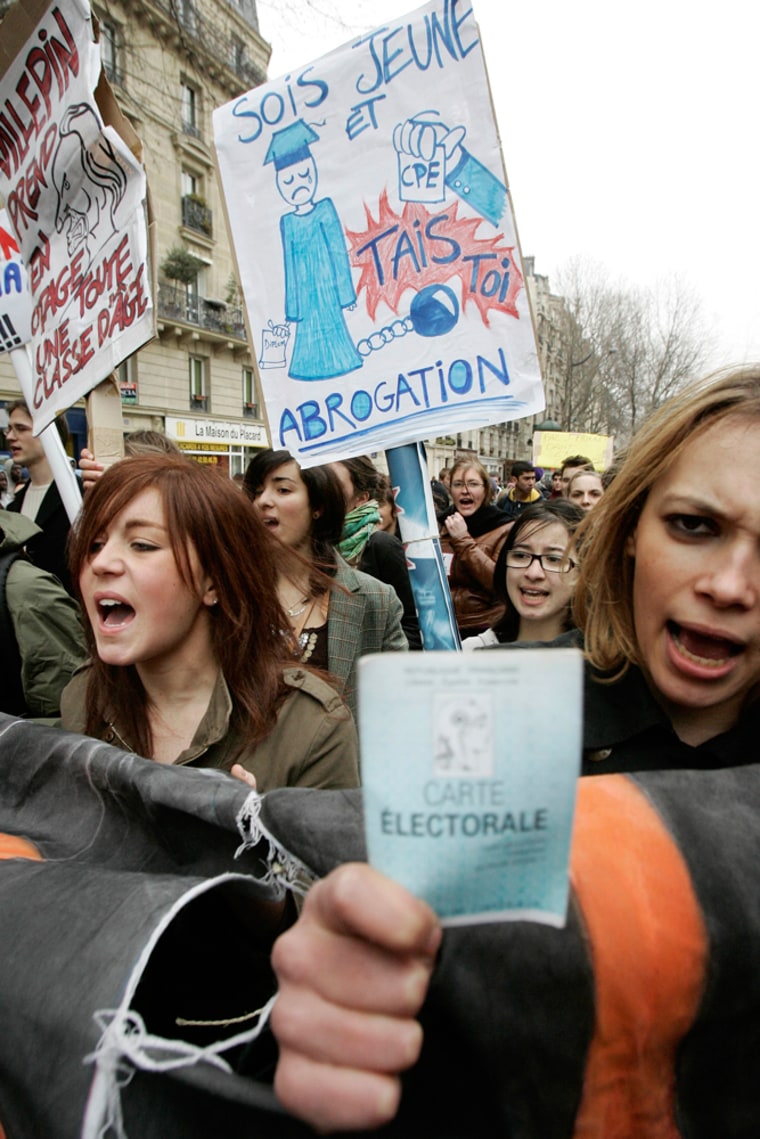PARIS — Camille Batsch is on the frontlines of France’s future.
An ardent student protestor, one of hundreds of thousands of youths who have swarmed the streets of France in recent weeks, Batsch is worried.
“When I graduate, I don’t know if I will find a job,” the 20-year-old Parisian said. “And even if I do find a job, I don’t know if I can keep it.”
France is facing a two-pronged problem.
The job market needs a big fix. Almost a quarter of the population between the ages of 15 and 24 is unemployed. And for those lucky enough to find fulltime work, often it takes years.
At the same time, as persistent street demonstrations show, few appear ready to accept the fundamental changes needed to the French social model.
“There can be no compromise,” Batsch said. “None at all.”
De Villepin’s plan
The government, still reeling from riots last fall in immigrant neighborhoods, where unemployment is as high as 50 percent, has proposed a solution.
Under the First Job Contract, or CPE as it is known in French, Prime Minister Dominique de Villepin wants to give French companies incentive to hire — by allowing them the flexibility to fire workers.
That’s an outrage in France, where job security is considered a birthright.
De Villepin’s plan would allow employers to fire workers without cause for up to two years. The students on the streets, backed by France’s powerful labor unions, say they want the same workplace protections their parents have.
“The CPE gives us no guarantees,” said Marion Cavanna, 20. “We are very scared for the future.”
While there is widespread sympathy for the students’ plight — a French newspaper poll showed more than two-thirds of the country supportive of their action — France’s rigid labor laws are taking their toll on the economy, which has seen next to no growth.
Jobs for life
David Donnat, a manager at a software company, says job laws can make it too expensive to hire in the first place.
“After six months, we are not able to fire workers,” Donnat said. “There needs to be more flexibility.”
Fulltime workers are guaranteed long-term health care, generous vacations and a full pension. Social security costs, which can amount to half a worker’s salary, are borne by employers. Staff can be fire for serious infractions, but essentially “they have a job for life,” Donnant said.
With hiring a risk, many French companies rely on short-term contracts get the job done, a practice that means it can take years for youths to land a fulltime job.
“And there’s a vicious circle,” said Benoit Caselli, an IT specialist working as an intern in Paris. “You have to have work experience to find a job, but companies don’t want to hire somebody if they don’t have work experience.”
For Caselli, 21, it’s a situation that breeds pessimism.
“If I can’t find a job in France, I will move abroad,” he said. “Maybe to the United States, Britain or Canada.”
‘Lost generation’
De Villepin has been vilified by students for pushing through what Marion Douzou, a 19-year-old English major demonstrating in Paris on Thursday, calls an “unequal law.”
“A government that doesn’t care about the youth is a lost country,” she said.
According to sociologist Michel Wieviorka, France's old social model — one of inclusions and work for all — is finished. He calls the youth on the streets of France the country’s “lost generation.”
“In my generation, we got, generally speaking, better jobs than our parents,” Wievorska said. “Today my children will get jobs maybe not as good as mine.”
France’s future, Wieviorka said, needs to be tied to a new model.
“What is important is, are we able to create a new model where people are not obliged to be given a job for their whole life? Are we able to create it, or are we obliged to defend the old system? This is why the country is at a crossroads.”
